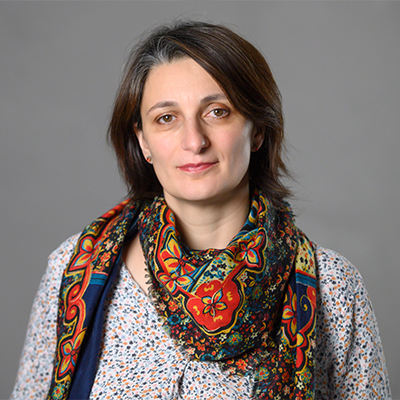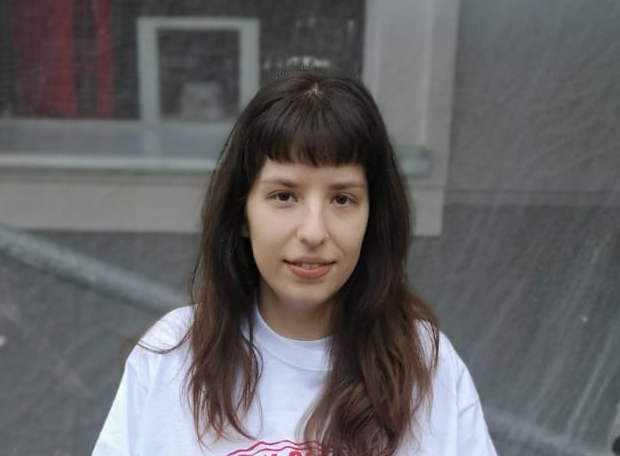Hi from Madrid,
As a journalist, there is a phrase I hate to hear: “Nobody is talking about this! You won’t see it in the media”. Usually, it’s not true, the problem is that you’re not looking in the right places.
But when we were preparing this issue of European Focus, I was struck by the sincerity of my German colleague and her concern about the unstoppable (or at least it seems) rise in global temperature.
We should be talking about global warming, not as a general concept for the future, but as a debate relevant to today. Are we really on the way to failing to limit the temperature increase to 1.5ºC? Should we already be preparing for a worst case scenario? How can we communicate without sounding like prophets of climate apocalypse? And in my case: what would be the face of an even hotter Spain?
Alicia Alamillos, this week’s Editor-in-Chief
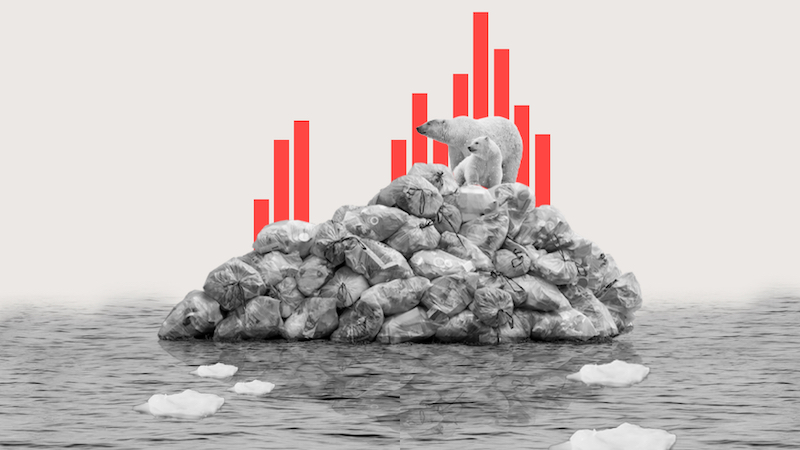
Two months ago, I attended a talk by former US president Barack Obama in Berlin. One sentence, which he said in parentheses, struck me: “Don’t give up. We may not succeed in achieving the limit of 1.5 degrees of global warming. But whether it will be 2.5 or three degrees does make a difference.”
According to scientists, a rise of global temperatures of just 1.5 degrees would make vast areas of the planet uninhabitable. Obama was talking about three degrees. So are we already saying goodbye to the 1.5 target? But nobody reacted to Obama’s words, neither the audience nor the moderator. Have we become complacent about our failure to achieve this? Was I the only one worried about that?
According to the renowned climate scientist Stefan Rahmstorf, Germany might heat up by six degrees if the global average warms up by three degrees. This is a horror scenario. The Berlin air is already difficult for the lungs to digest due to the lack of rain.
But there’s hardly a debate about this in Germany. Politicians tell us: “Well, we are aiming for 1.5 degrees”, but only very few are talking about the obvious: that by continuing in this way, we will certainly not make it.
Instead, the public debate goes something like this: Isn’t it inconvenient to change our heating systems? Isn’t it annoying to be asked to drive less? Aren’t climate activists who hold up traffic counterproductive, because they stop us from talking about climate change, and change the conversation to one about blocked streets? As if more people would talk seriously about climate protection if there were no traffic jams…
I long for a debate on these questions: Do we want to stick to the 1.5 degree limit? Do we realise what is at stake if we don’t? And if we do want to stick to it: What do we need to do to win this race? Today, insisting on these questions is often seen as ideological, not practical.
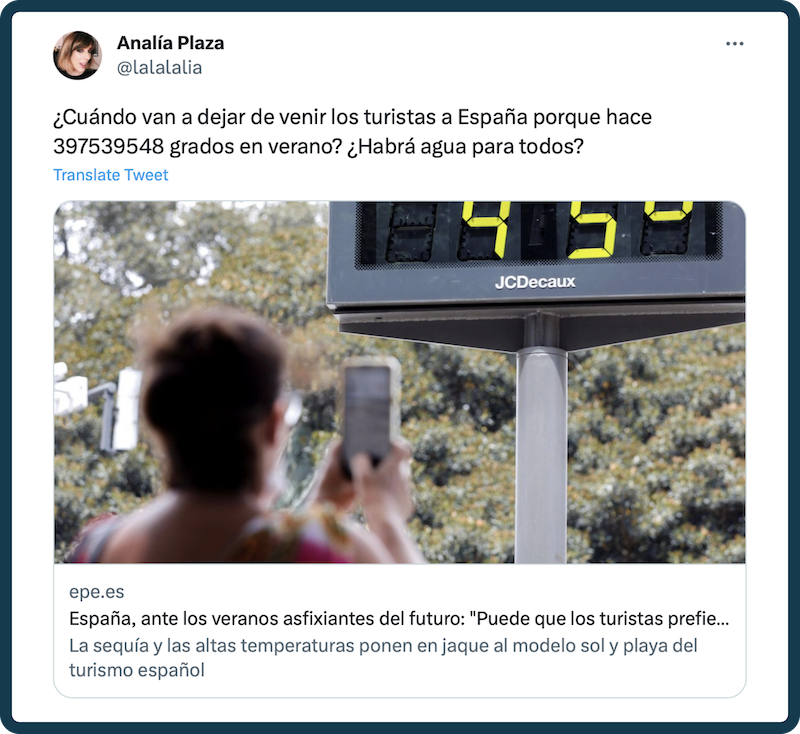
Spain, face to face with the suffocating summers of the future: ‘Tourists may prefer to stay at home’ is the title of a recent article in El Periódico de España. As global warming increases, Spain will be one of the worst affected countries in Europe. The crisis will not only be ecological, but also economic, affecting the two main sources of GDP: agriculture and tourism.
That’s what Twitter user @lalalia is asking: “When will tourists stop coming to Spain because it is 397,539,548 degrees in the summer? Will there be water for everyone?”
The reservoirs in Andalusia (the south, the breadbasket of Spain and the most touristic area) are already suffering from drought. We have to decide: Do we use the water for the tourists, the agriculture or for our own Spanish citizens?
“We must prepare France for +4 degrees of warming,” Christophe Béchu, the minister for ecological transition, admitted in February. Today, France is experiencing +1.8 degrees of warming, which is already having far-reaching consequences. Given that the world is heading for at least a three degree rise by 2100, and that France is heating up faster than the global average, this prediction is not an exaggeration.
At +4 degrees, heatwaves could last for two months, heat peaks could reach 50ºC for several days in a row, the wildfire season would last twice as long as today, and blazes could ravage the north of the country. Snow would disappear in the mid-mountains, and rainfall would be much more intense and sudden in the plains, with an increased risk of flooding.
Beyond the global strategies to try to avoid the scenario of global warming, France has started to think about preparing for the worst. How can we adjust to such a future? This is the question posed by the government, which has launched a national online consultation. The results, which will be collected over the summer, will help define a new plan for adapting to global warming.
One of the biggest challenges is preparing public infrastructure for such conditions. Some roads will have to be relocated because of the risk of flooding and railways will have to be redesigned because today’s TGV can’t run when the ground temperature is above 57 degrees.
Another key issue is to help municipalities adapt to extremely high temperatures. Roofs and walls could be painted in white to reflect heat, pipe networks should be repaired to avoid loss of drinking water, wastewater could be reused on an individual (shower water for toilets) or collective level.
All this will cost money. “The adaptation measures to be taken now will represent at least an additional 2.3 billion euros per year,” the government has already warned.

This summer will be hot and bloody for bears in Romania. The last act of the outgoing minister of the environment, Barna Tánczos, was authorising the shooting of 426 brown bears.
Romania is home to 60 percent of Europe’s bear population (excluding Russia) with numbers of between 7,500 and 8,000. Deforestation, more agricultural areas, poor waste disposal and a changing climate contribute to the growth of the bear population.
As the number of bears increases, so does conflict between humans and bears. Rising temperatures are also disrupting their hibernation patterns. The only official response is to order a bear hunt.
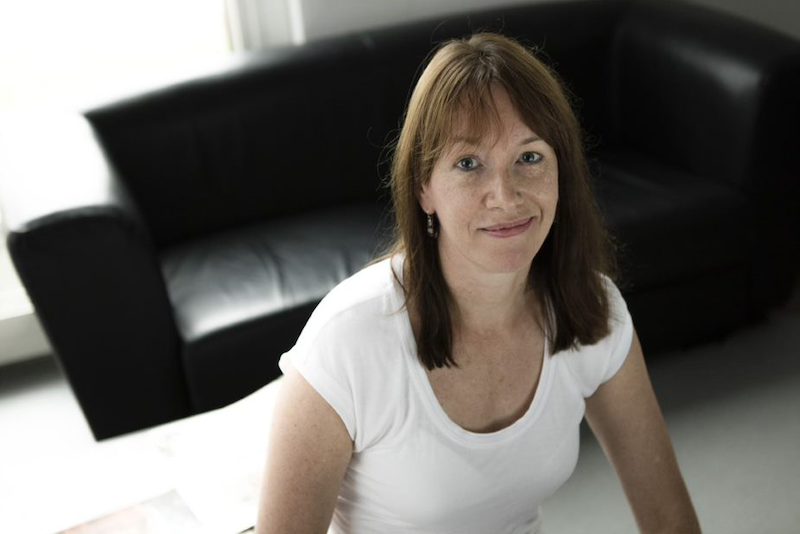
Alison Anderson is a professor at the University of Plymouth with expertise in climate change communication. She’s also a founding member of the International Environmental Communication Association.
What’s missing from the conversation on climate change?
There’s a lot of emphasis on the impacts of climate change, but there’s not nearly enough emphasis on the solutions. Giving people more and more information is not the answer. Talking about climate change is obviously helpful, but getting people engaged and learning by doing seems more beneficial.
How should governments communicate about global warming and adaptation measures without alienating the population?
Trust is such a key factor, and I don’t think enough thought has been given to the question of acceptance and getting the public on board. Fairness is also a key issue because if a policy is not perceived as fair, it is unlikely to gain acceptance. We need a bottom-up approach on the local level with stakeholders that people trust. Seeing positive steps that can be taken in their local area and community is what makes people energised and enthused.
Besides, government communication on climate change is often very urban-focused, lacking consideration for people living in rural areas. But you can’t have a one-size-fits-all model. The messages need to be fine-tuned towards particular groups within society, in terms of demographics, but also in terms of where people live.
Should we focus on adaptation or on fighting global warming?
I don’t think it’s one or the other. There’s so much more that we could be doing, but it involves a systemic change to make headway quickly enough. And that’s realistically difficult to achieve and takes a lot of time, though the pandemic has illustrated how change can occur quite fast. It’s a combination of carrots and sticks. You need the incentives, but also you need the regulation. You cannot rely on people making the decisions themselves.
Thanks for reading the 36th edition of European Focus,
Today, a friend of mine has just cancelled our lunch date: “It’s too hot outside”.
Yes, Spain is always hot in the summer – but if we do not at least acknowledge this could be the coolest summer of the rest of our lives, the future is going to look like a boiling pot.
Know what you’re up against, then act.
See you next Wednesday!
Alicia Alamillos





